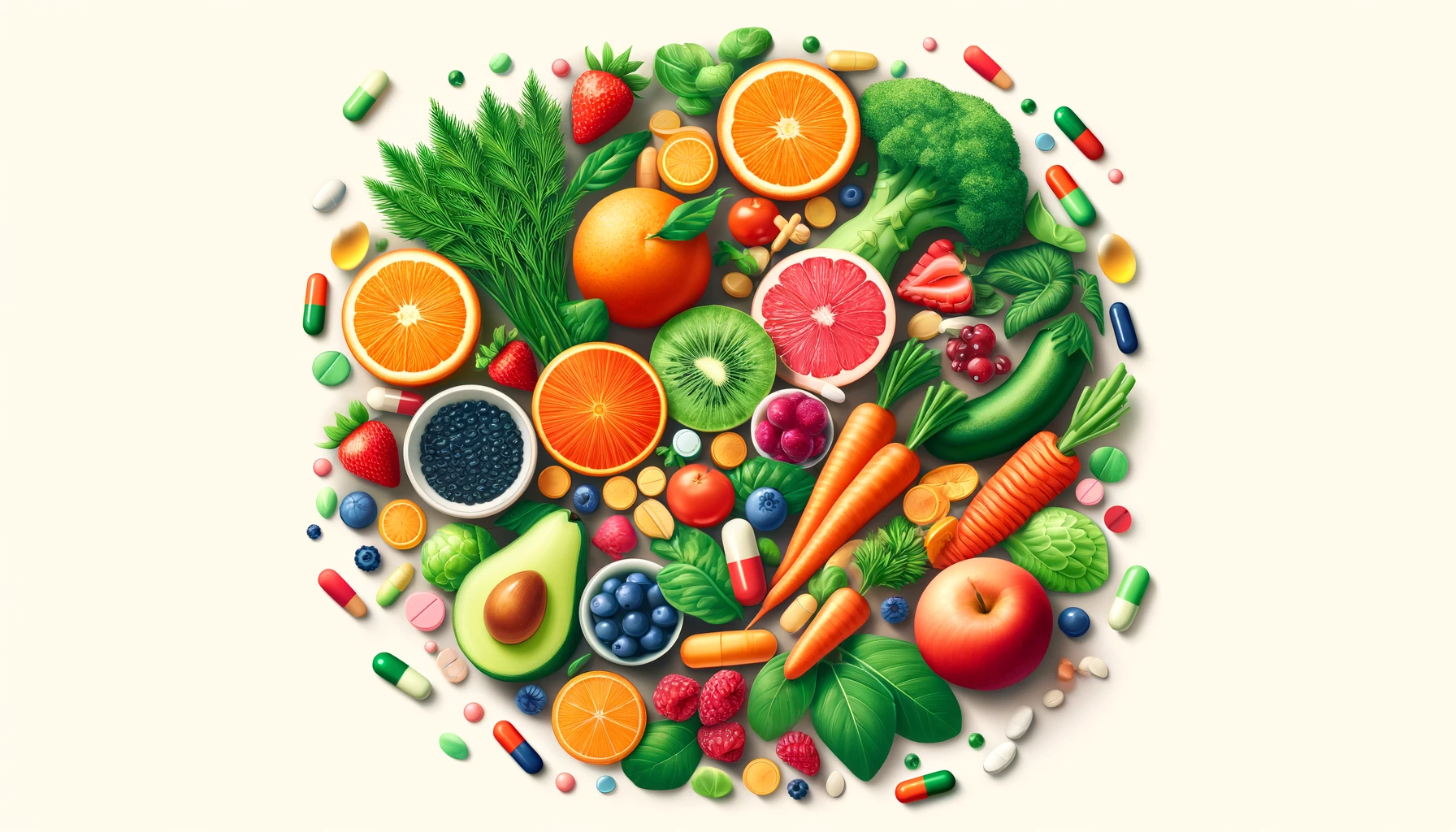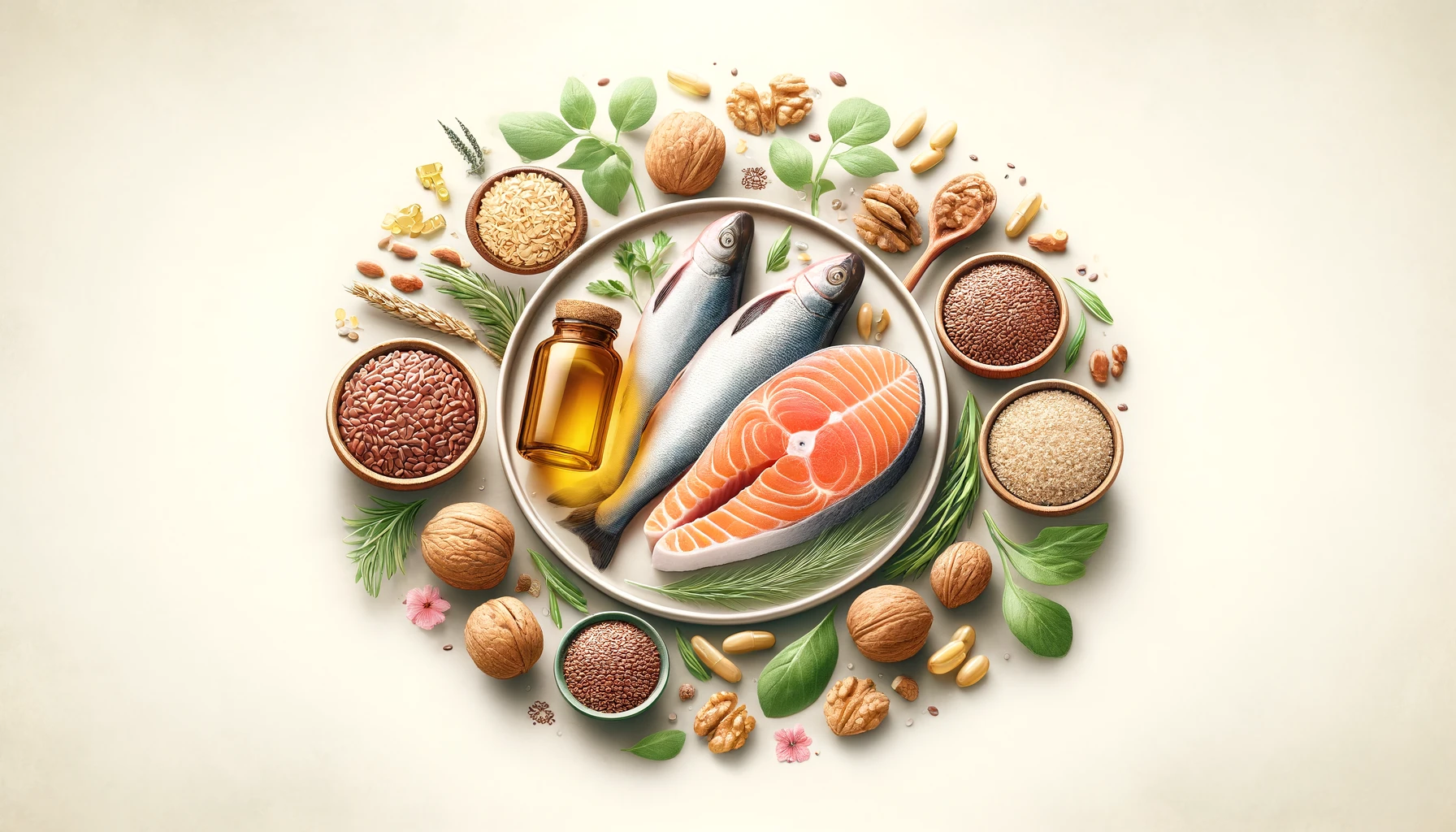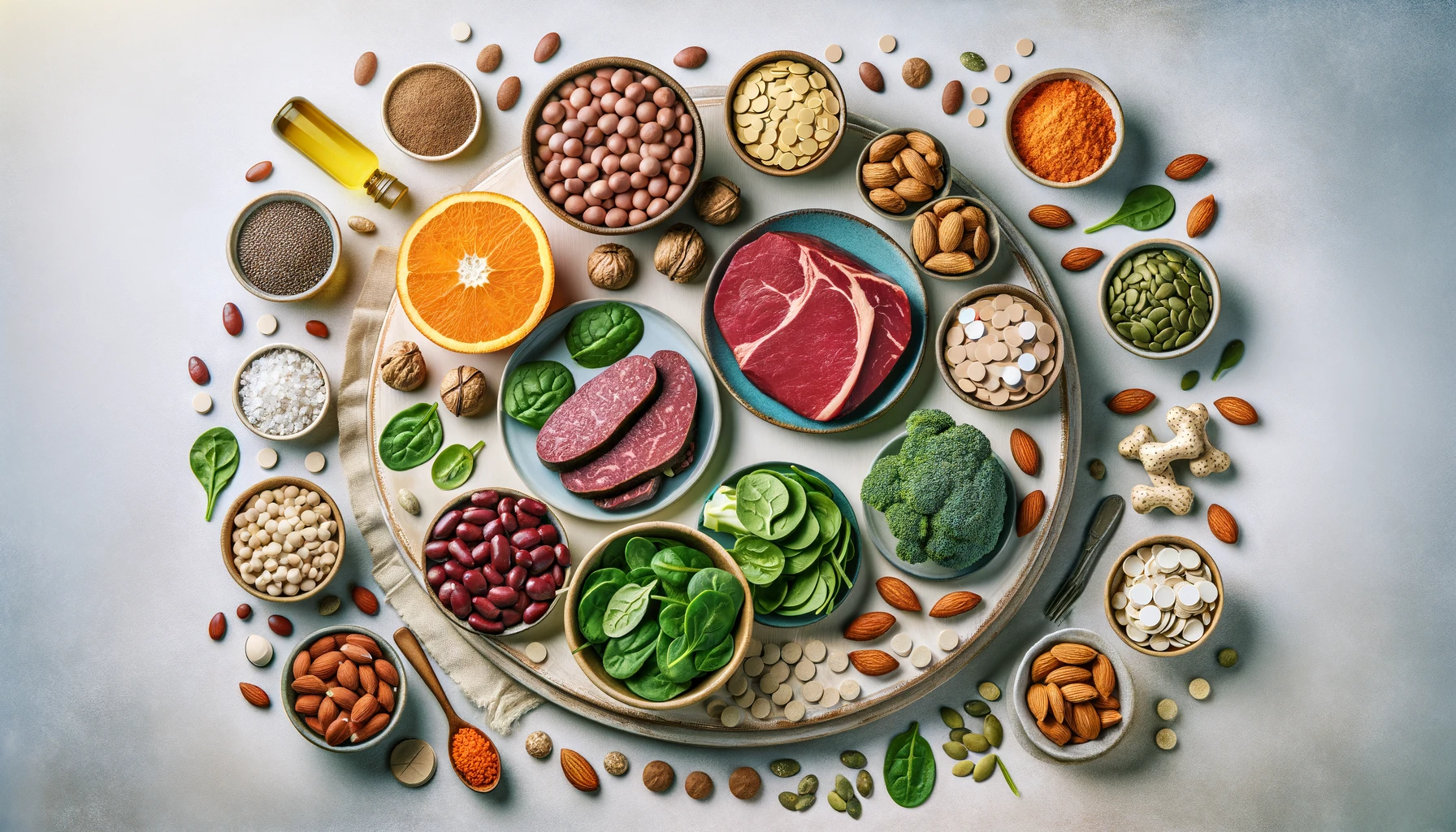Nutrition tips for healthy and long eyelashes
Did you know that a healthy diet not only improves your overall health but also promotes the growth of your eyelashes? A balanced diet can help not only gain energy, lose weight, improve digestion, cleanse the liver, or get better skin but also support the growth of your hair, including your eyelashes. Many people are unaware that certain nutrients can significantly affect eyelash growth. In this article, you will learn which foods can make your eyelashes grow longer and thicker and how you can adjust your diet accordingly. Stay tuned and discover how you can naturally strengthen your eyelashes through the right nutrition! Plus, you'll find valuable tips for eyelash growth.
All suggested amounts serve as guidelines to promote a balanced and nutrient-rich diet that can support the growth and health of your eyelashes. It is important to understand that these recommendations are flexible guidelines and should not be viewed as strict rules.
The Essentials in Brief
-
Biotin promotes the production of keratin, which forms the main component of your eyelashes, giving them structure and strength.
-
Omega-3 fatty acids nourish the hair follicles and promote hair growth, leading to healthier and stronger eyelashes.
-
Iron and zinc are crucial for the health of hair follicles and promote the growth of strong and healthy eyelashes. These nutrients can help you achieve your dream lashes.
Important Vitamins for Healthy Eyelashes

Vitamins are essential nutrients that our body needs in small amounts to function properly. Healthy eyelashes protect the eye from external influences such as sun, wind, dirt, and sweat droplets. They play a crucial role in the growth and health of your eyelashes. Each type of vitamin supports different functions that together help keep your eyelashes strong, long, and healthy. Some vitamins promote the production of keratin, the main component of eyelashes, while others protect the hair follicles or improve blood circulation. Here are the most important vitamins you need for healthy and strong eyelashes:
Did you know...
Another natural remedy to promote eyelash growth is green tea. Green tea contains antioxidants and vitamins that can support the growth of long and thick eyelashes. To use green tea as a home remedy, brew the tea, dip a cotton swab in the cooled tea, and apply it to your eyelashes for 15 minutes. It is recommended to do this application twice daily.
Biotin for Strong Eyelashes (Vitamin B7)
Biotin, also known as Vitamin B7, plays a crucial role in the production of keratin, a protein that forms the main component of your eyelashes, giving them structure and strength. It not only promotes the growth of eyelashes but also strengthens the hair follicles from which the eyelashes grow. Hair follicles are small structures in the skin that anchor the hair and provide it with nutrients. Healthy hair follicles are therefore crucial for strong and healthy eyelashes. A lack of biotin can lead to brittle eyelashes and hair loss, as the production of keratin is impaired and the hair follicles are not sufficiently supported. The use of mascara can additionally strain the eyelashes, so adequate biotin intake is important.
Did you know?
Our Eyelash Serum contains only natural ingredients such as:
- Pumpkin Seed Extract - Rich in zinc, amino acids, and vitamins, it helps balance the eyelashes and make them look more voluminous.
- Biotin - Contains Vitamin B7 and Vitamin H. It is an essential factor for maintaining healthier-looking eyelashes.
- Panthenol - Contains Vitamin B5, which envelops the eyelashes with moisture and nutrients, thus improving the overall appearance.
- Swertia Japonica Extract - Extracted from the Swertia Japonica plant, contains high concentrations of natural flavonoids and antioxidants, which stimulate hair growth.
- Panax Ginseng - Has been used for centuries in traditional Chinese medicine. Ginseng contains two important substances: ginsenosides and gintonin. These substances complement each other to offer numerous health benefits. The main benefit is the strengthening properties - it increases skin cells that strengthen the hair follicles from the root. It also promotes new growth and prevents thinning.
The benefits seem endless, and these are just 5 of our ingredients!
Recommended Daily Portion: Adults should consume about 30-100 µg of biotin per day.
| Food | Biotin Content (per serving) | Recommended Amount | Total Vitamin Content |
|---|---|---|---|
| Eggs | 10 µg per large egg | 3 eggs per day | 30 µg Biotin |
| Almonds | 5 µg per 100 g | 100 g (about a handful) | 5 µg Biotin |
| Salmon | 4 µg per 100 g | 100 g | 4 µg Biotin |
| Sweet Potatoes | 2.4 µg per 100 g | 100 g | 2.4 µg Biotin |
| Avocado | 1.85 µg per avocado | 1 avocado | 1.85 µg Biotin |
| Total Biotin per Day: | ~43.25 µg Biotin | ||
Vitamin E as a Protector for Healthy Eyelashes
Vitamin E is a powerful antioxidant that supports the health of hair follicles. But what does it mean that Vitamin E is an antioxidant, and why is that important for your eyelashes? Antioxidants are substances that protect cells from damage caused by free radicals. Free radicals are unstable molecules that can arise from environmental factors such as UV radiation and pollution and can damage cells. By acting as an antioxidant, Vitamin E protects the hair follicles of your eyelashes from these damages. Healthy hair follicles lead to stronger and healthier eyelashes. Vitamin E protects cells from oxidative stress and promotes blood circulation in the scalp and around the eye area, which supports the growth and health of the eyelashes.
It is also important to carefully remove makeup before going to bed, as mascara is heavy and can cause eyelashes to fall out or break. Makeup can clog the pores around the eyes and make the growth of new eyelashes more difficult.
Recommended Daily Portion: Adults should consume about 15 mg of Vitamin E per day.
| Food | Vitamin E Content (per serving) | Recommended Amount | Total Vitamin Content |
|---|---|---|---|
| Sunflower Seeds | 10 mg per 100 g | 30 g (about a small handful) | 3 mg Vitamin E |
| Almonds | 7.3 mg per 28 g | 40 g (about a handful) | 10.4 mg Vitamin E |
| Spinach | 2.9 mg per 100 g cooked | 100 g cooked spinach | 2.9 mg Vitamin E |
| Avocado | 2.1 mg per avocado | 1 avocado | 2.1 mg Vitamin E |
| Vegetable Oils (Olive Oil) | 12 mg per tablespoon | 1 tablespoon | 12 mg Vitamin E |
| Total Vitamin E per Day: | ~30.4 mg Vitamin E | ||
Vitamin C for Collagen and Better Iron Absorption
Vitamin C acts as an antioxidant and supports collagen production, which is important for the health of the eyelashes and the skin around the eyes. Collagen is a protein that provides structure and firmness in the skin and hair. Another benefit of Vitamin C is its ability to improve iron absorption. Iron is an essential mineral necessary for hair growth as it supports oxygen transport to the hair follicles. Foods like beef liver, rich in biotin, also contain a lot of iron, which means that Vitamin C can help get the maximum benefit from these foods.
Recommended Daily Portion: Adults should consume at least 75-90 mg of Vitamin C per day.
| Food | Vitamin C Content (per serving) | Recommended Amount | Total Vitamin Content |
|---|---|---|---|
| Orange | 70 mg per orange | 1 orange | 70 mg Vitamin C |
| Strawberries | 85 mg per 150 g | 150 g (about a cup) | 85 mg Vitamin C |
| Red Bell Pepper | 190 mg per medium pepper | 1 medium pepper | 190 mg Vitamin C |
| Kiwi | 71 mg per kiwi | 2 kiwis | 142 mg Vitamin C |
| Broccoli | 81 mg per 100 g cooked | 100 g cooked broccoli | 81 mg Vitamin C |
| Total Vitamin C per Day: | ~568 mg Vitamin C | ||
Omega-3 Fatty Acids for Longer Eyelashes: How They Work

Omega-3 fatty acids are essential fats, which the body cannot produce on its own, so they must be obtained through diet. They play an important role in many body functions, including the health of skin and hair. They are especially beneficial for eyelashes, as they nourish the hair follicles and promote hair growth.
Omega-3 fatty acids have anti-inflammatory properties, which is particularly helpful in reducing inflammation around the hair follicles that can lead to hair loss. They improve blood circulation in the area of the hair follicles, promoting hair growth and helping the hair become healthier and stronger.
Here are some of the best food sources of omega-3 fatty acids that can be incorporated into your daily diet to support the health of your eyelashes:
Fatty Fish as a Main Source of Omega-3
Fatty fish such as salmon, mackerel, and sardines are excellent sources of omega-3 fatty acids. These fish contain high amounts of EPA and DHA, two types of omega-3 fatty acids that are particularly effective for the health of skin and hair.
Omega-3 Table
| Food | Omega-3 Content (per 100 g) | Recommended Serving Size | Total Omega-3 Content per Serving |
|---|---|---|---|
| Salmon | approx. 2.5 g | 150 g (about the size of an adult's palm) | approx. 3.75 g Omega-3 |
| Mackerel | approx. 2.6 g | 150 g | approx. 3.9 g Omega-3 |
| Sardines | approx. 1.4 g | 150 g (several small fish) | approx. 2.1 g Omega-3 |
| Recommended Consumption Frequency: 2-3 servings of this fish group in total per week | |||
Plant-Based Sources of Omega-3
For vegetarians or people who don't like to eat fish, flaxseeds and chia seeds are excellent plant-based sources of omega-3.
| Food | Omega-3 Content (per 100 g) | Recommended Serving Size | Total Omega-3 Content per Serving |
|---|---|---|---|
| Flaxseeds | approx. 22.8 g ALA | 2 tablespoons (approx. 30 g) | approx. 6.84 g ALA |
| Chia Seeds | approx. 17.8 g ALA | 2 tablespoons (approx. 30 g) | approx. 5.34 g ALA |
| Recommended Consumption Frequency: Daily | |||
Other Sources: Walnuts
Walnuts are also a good source of omega-3 fatty acids, especially ALA, the plant form of omega-3.
Other Source: Walnuts
| Food | Omega-3 Content (per 100 g) | Recommended Serving Size | Total Omega-3 Content per Serving |
|---|---|---|---|
| Walnuts | approx. 9.1 g ALA | 30 g (about a handful) | approx. 2.73 g ALA |
| Recommended Consumption Frequency: Daily | |||
How Minerals Support the Growth and Care of Your Eyelashes

While vitamins and omega-3 fatty acids are crucial for overall health and hair growth, minerals like iron and zinc play a unique and equally important role in the care and growth of your eyelashes. These minerals are not only essential for the overall health of hair follicles but also for specific functions that directly affect eyelash growth. Healthy eyelashes can intensify the gaze and give the eye more depth and expression.
Iron: Promoting Eyelash Health through Improved Blood Circulation
Iron is essential for the formation of hemoglobin, the protein in red blood cells that transports oxygen to the hair follicles. Adequate oxygen supply is essential for the health of hair follicles, which in turn is important for the growth of strong and healthy eyelashes. Iron deficiency can reduce the oxygen supply to these follicles, leading to weaker eyelashes and increased eyelash loss.
Recommended Iron Sources for Healthy Eyelashes
-
Red Meat: Beef and lamb are rich in heme iron, which the body can more easily absorb. A moderate amount, e.g., a few times a week, can help meet iron needs.
-
Legumes: Lentils, chickpeas, and beans are good plant-based iron sources. These should be regularly integrated into the diet, especially for vegetarians and vegans.
-
Spinach: This green plant is an excellent source of non-heme iron and also contains Vitamin C, which improves iron absorption.
Recommended Daily Dose for Adults: 8 mg (men) to 18 mg (women) of iron per day.
Note: It is important to combine various iron-rich foods to ensure daily iron intake. For individuals with special health needs or iron deficiency, consultation with a doctor is advisable.
Zinc: Supporting Eyelash Growth through Cell Repair and Growth
Zinc is another important mineral that plays a central role in protein production and cell division. These processes are essential for the growth and renewal of eyelashes. Zinc not only helps build hair structure but also protects the oil glands at the base of the eyelashes, making them healthier and more resistant to falling out.
Recommended Zinc Sources for Healthy Eyelashes
-
Meat: Beef and chicken are excellent sources of zinc. Regular but moderate consumption of meat can help meet zinc needs.
-
Nuts and Seeds: Pumpkin seeds and cashew nuts are rich in zinc and can be easily integrated into the daily diet, whether as a snack or as an addition to meals.
-
Seafood: Oysters and crabs are particularly high in zinc and offer an excellent way to increase zinc levels when regularly included in the diet.
Recommended Daily Dose for Adults: 8-11 mg of zinc per day.
Note: Since zinc needs can vary depending on individual needs, intake should be adjusted to personal dietary habits and health status. Consultation with a nutritionist or doctor can be helpful to ensure optimal intake.
Quiz
Your Results:
Conclusion
The proper intake of vitamins, omega-3 fatty acids, iron, and zinc can make a significant difference in the health and growth of your eyelashes. A balanced diet rich in these nutrients can help prevent hair loss and promote the natural growth of your eyelashes. It's important to combine these nutrients through a variety of foods and tailor them to your individual dietary needs. By paying attention to these nutrition tips, you can not only improve the health and growth of your eyelashes but also enhance your overall well-being.
Instead of resorting to artificial methods, you should focus on the natural care of your eyelashes to emphasize their length and volume.
Frequently Asked Questions (FAQ)
How often should I consume omega-3 fatty acids?
It is recommended to eat 2-3 servings of fatty fish per week or integrate plant-based sources such as flaxseeds and chia seeds daily.
Can I consume too much biotin?
Biotin is water-soluble, and excess biotin is usually excreted through urine. Moderate intake is safe and supports eyelash health.
Which foods are the best sources of iron?
Red meat, legumes like lentils and chickpeas, as well as green leafy vegetables like spinach, are excellent sources of iron.
How does Vitamin C help with eyelash health?
Vitamin C promotes collagen production and improves iron absorption, contributing to the strengthening and health of the eyelashes.
How can I ensure I get enough zinc?
By regularly consuming zinc-rich foods such as meat, nuts, seeds, and seafood, you can ensure you get enough zinc for healthy hair growth.
Yours, Jessi 💖


